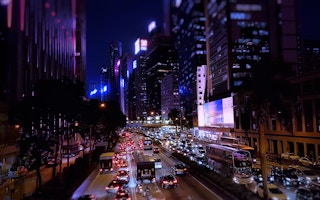Often touted as the future of transportation, electric vehicles have gained popularity in recent years due to their ultra-low emissions, reduced noise pollution and maintenance costs.
To continue reading, subscribe to Eco‑Business.
There's something for everyone. We offer a range of subscription plans.
- Access our stories and receive our Insights Weekly newsletter with the free EB Member plan.
- Unlock unlimited access to our content and archive with EB Circle.
- Publish your content with EB Premium.
But instead of placing their bets on electric vehicles alone, governments and urban planners must promote public transport and enable different modes of transportation to tackle one of the most pressing challenges that cities face—traffic congestion, said Low Ka Hoe, chief strategy officer at Singapore-headquartered firm ST Engineering.
He was speaking at a session on the future of mobility on Thursday at the Innovfest Unbound event. Part of Singapore’s Smart Nations Innovation Week, the event was organised by the National University of Singapore’s entrepreneurial arm NUS Enterprise and innovation platform Unbound, in partnership with the Infocomm Media Development Authority of Singapore.
“To ease traffic congestion, you need to make sure that people go back to taking mass public transport. Private electric cars and autonomous vehicles are all very flexible and convenient, but if everyone uses them, traffic will be terrible,” Low observed.
Traffic jams cost the world US$460 billion in 2017 and this amount is expected to double by 2030, he said. Congestion exacts a cost on drivers, public health and the economy.
Hype has built around electric vehicles in recent years, as cities around the world seek to cut harmful emissions from conventional internal combustion engines. With advancements in storage technology, computing performance and energy efficiency, the number of battery-powered cars is growing rapidly.
As of 2018, the global fleet exceeded 5.1 million—up 2 million from the previous year—and will reach an estimated 13 million by the end of the decade as countries implement policies ranging from fuel economy standards to incentives for zero-emissions vehicles.
“With the rate at which the costs of batteries are coming down, electric vehicles will be cheaper than combustion engine cars in just a couple of years. At the same time, advanced sensors and processing power have made autonomous driving possible,” said Low.
But cities need to invest in better infrastructure such as charging facilities, fixed routes for self-driving cars and busses as well as dedicated lanes for e-bikes, he said. Governments must also facilitate cooperation among transport players.
“We have all these interesting solutions such as shared mobility, electric vehicles, autonomous vehicles and e-bike rental services, but the question is how we make these services work together,” said Low.
Singapore should aim for a system “where people step out of their house, use an autonomous car, bus or shared vehicle to get to the nearest train station, then take a train into town where they find an e-scooter waiting for them that brings them to the doorstep of their office”, he said.
Another panellist, Yann Marteil, managing director of Paris-headquartered mobility company Via ID and deputy general manager of French vehicle servicing firm Mobivia Groupe, said cities have to ensure that different modes of transportation benefit both the individual and the system.
Car sharing platforms or transportation networks organised by companies such as Go-Jek could also reduce the number of private vehicles in urban spaces, he said.
“No one needs to have their own car. Carsharing platforms and mobility networks have the potential to fundamentally change Southeast Asia’s transportation landscape,” he said.










